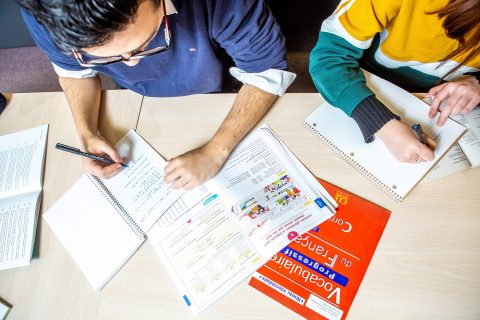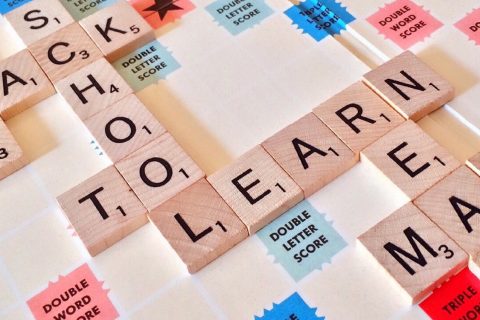Traduction (Translation) (BA)
Why study Translation?
The more interconnected the world becomes, the more it needs translators: people with quick, inquisitive minds and intercultural expertise that enables them to work in diverse professional situations.
To become a translator, you must start with an excellent knowledge of French and English. We’ll help you master the language towards which you translate and establish a thorough command of your source language.
You will choose from one of two streams: if your dominant language is English, you learn to translate from French to English. If your dominant language is French, you translate from English to French. In addition to translation courses, you take language, linguistics and literature courses to sharpen your skills and acquire a high level of proficiency in reading and writing.
Our program is officially recognized by the Canadian Association of Schools of Translation (CAT). A BA obtained upon completion of the Specialization in Translation can lead to certification by the Ordre des traducteurs, terminologues et interprètes agréés du Québec (OTTIAQ).
Program highlights
- Opportunities to pursue personalized translation projects based on your interests
- Opens up numerous career paths, from public relations to education
Special funding for out-of-province students
Up to $4000 for undergraduate programs.
Program structure
A Bachelor of Arts degree takes a minimum of three or four years (90 – 120 credits) of full-time study, depending on your academic background.
Program options
Specialization in Traduction (Translation) (72 credits)
Students in the specialization choose one of two options:
- Option A: French to English
- Option F: English to French
The BA Spécialisation en traduction is a limited-enrolment program. As it requires excellent knowledge of both English and French, students admitted to the program must take placement tests in both languages.
Majeure en traduction (48 credits)
The BA Majeure en traduction enables students to develop skills in both English and French, languages that are highly valued on the job market. It also give students the flexibility to take elective courses in other areas or to add another program such as a Minor to fulfill the degree requirements.
As the program requires good knowledge of both English and French, students must take placement tests in both languages on admission. It is possible to change your concentration from the Major to the Specialization once you meet the following criteria: you must have obtained 24 credits of program courses including 6 credits of translation courses, with an overall minimum B average in the program courses and a B average in the FTRA courses.
Courses
Co-op program
The Co-op program in translation gives you the opportunity to learn about the translation milieu and to experience the professional work environment first-hand. You complete paid work terms, alternating with full-time study terms, in translation or related areas like terminology and project management. It’s an invaluable chance to gain practical experience. An entrance test and an interview are required in order to be admitted to the Co-op program.
Note: The Co-op program is only available for the Specialization.
United States students: A U.S. Federal Student Aid-eligible version of this program is offered. This version meets all U.S. regulations (such as no co-operative education or e-courses) for eligible programs.
Admission criteria
Minimum cut-off averages and course requirements
- Quebec Cegep: Specialization: 25, Major: DEC
- High School: Specialization: B- | Major: C+
- ACT or SAT is NOT required
- Canadian curricula course requirements
- Accepted international qualifications
- International Baccalaureate (IB) diploma: Specialization: 27 | Major: 26
- International Baccalaureate Career-related Programme (CP): Specialization: 4.5/7 | Major: 4.3/7
- Baccalauréat français: Specialization: 12 | Major: 11
- British system of education (GCE):
- A-levels: At least two A-level exams CD or
- AS-levels: At least 4 AS-level exams with equivalent results or
- BTEC: Level 3 Diploma or Extended Diploma in a related subject area with equivalent results
- Additional information for British System of Education (GCE) applicants
- University Transfers (internal/external): Specialization: B- | Major: C
CEGEP students
Two CEGEP courses or equivalent in the language towards which the student wishes to translate. If these courses were not available in the CEGEP attended, the student may be required to complete them at the university level.
Minimum cut-off averages should be used as indicators. The cut-off data may change depending on the applicant pool. Applicants who meet the stated minimum requirements are not guaranteed admission to these programs.
Application deadlines

FALL ENTRY (September)
Deadline: March 1
U.S. and international applicants: Apply no later than February 1 to allow time for immigration document processing. However, applying earlier is strongly recommended. Immigration processing times vary by country and delays could prevent you from starting your studies on time.

WINTER ENTRY (January)
Deadline: November 1
U.S. and international applicants: Apply no later than August 1 to allow time for immigration document processing. However, applying earlier is strongly recommended. Immigration processing times vary by country and delays could prevent you from starting your studies on time.
We reserve the right to close admission to a program at any time after the official deadline without prior notice.
Student story

Hope Cornell
Specialization in Traduction - Translation (FR to EN) Minor in Philosophy
As a native Montrealer, Hope Cornell always enjoyed the immersion of studying in French and English, so Translation felt like a natural choice.
Other programs of interest

Our Creative Writing program, one of the first of its kind in Canada, immerses you in every aspect of the writing life, from the development of ideas to the publication of finished works.
Department
Faculty

Whether you’re an absolute beginner or a francophone, you’re welcome here. You study French at your own pace. We offer a wide variety of language courses and you’re able to choose from academic paths in linguistics, literature or translation.
Department
Département d'études françaises
Faculty

Linguistics is the scientific study of the human language faculty. In this field, you will treat language as a scientist, investigate it as a phenomenon, and study its structure, theory and history.
Department
Department of Classics, Modern Languages and Linguistics
Faculty

